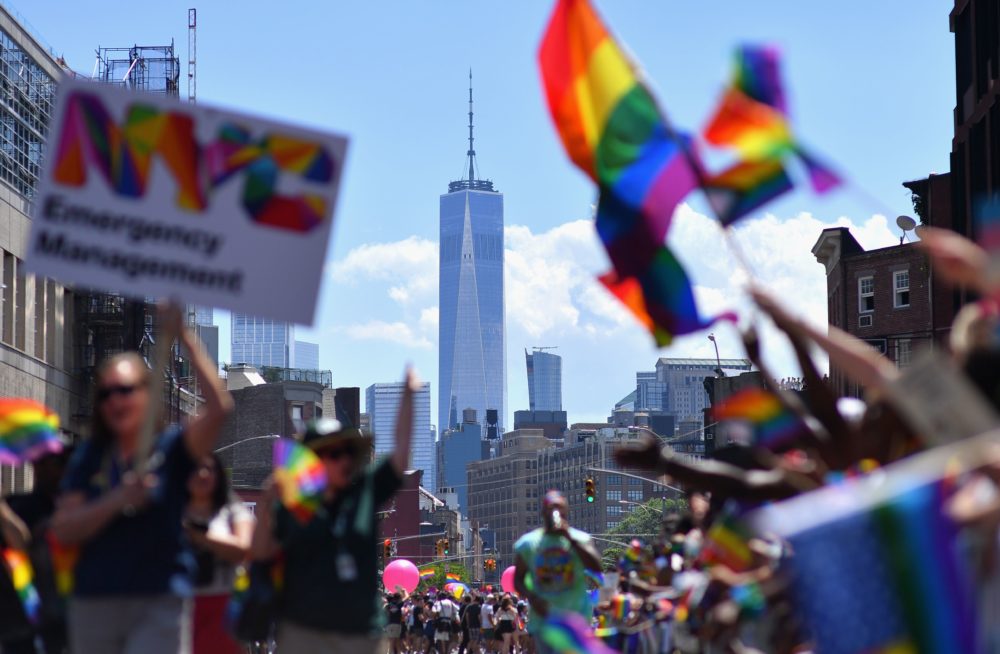Advertisement
New York City To Repeal Ban On Gay Conversion Therapy

Editor's note: In the following interview, the guest cites the Southern Poverty Law Center and its position that the Alliance Defending Freedom (ADF) is a hate group. The ADF disputes this characterization and we acknowledge that questions have been raised in recent years about some of SPLC’s findings.
The New York City Council is going to repeal its a ban on gay conversion therapy over concern the Supreme Court could end up reversing the law.
Gay conversion therapy is the practice of trying to change a person's sexual orientation from gay to straight. It’s been discredited by the American Psychiatric Association, among other organizations, but it’s still legal in more than 30 states.
Despite this repeal, attempting gay conversion therapy on minors will remain illegal in the city thanks to a statewide ban on the practice passed in January, says Speaker of the Council Corey Johnson, who is openly gay and HIV-positive.
Johnson says LGBTQ civil rights groups recommended the council repeal the ban in fear that lawsuits filed by anti-LGBTQ groups that claim the law is unconstitutional could elevate to the federal court system, which has become more conservative.
“I couldn't in good conscience risk a bad decision that could have a chilling nationwide effect,” he says, “and potentially put more children in harm's way.”
Circuit courts in New York state and the U.S. Second Circuit Court of Appeals, which covers New York City, have grown more conservative in recent years alongside the Supreme Court, he says.
Last June, the Supreme Court ruled against a California law that mandated anti-abortion crisis pregnancy centers fully disclose their objectives to patients.
Johnson says this case shows the Supreme Court is “likely to apply a stricter level of scrutiny to restrictions on professional speech,” which could encompass conversion therapy.
Advertisement
“I was conflicted because I didn't want to in any way buckle or give in to these right-wing organizations that are looking to weaken protections for LGBT people,” he says. “But at the end of the day, I think this is the best course of action.”
An estimated 16,000 LGBTQ youth will receive conversion therapy from a licensed healthcare professional before they turn 18 in states where the practice is legal, The Williams Institute at Univerity of California Los Angeles reported in June.
Kids who are subjected to conversion therapy attempt suicide at double the rate of their LGBTQ peers, and the rate is tripled when children experience “home-based” attempts at changing their sexuality by parents on top of efforts from therapists and religious leaders, according to The Family Acceptance Project.
Conversion therapy often entails inducing nausea, vomiting or paralysis and shocking patients with electricity, according to the American Psychiatric Association.
The Supreme Court has upheld appeals court decisions regarding New Jersey’s anti-conversion therapy law three times and refused to hear challenges to California’s ban on two occasions, according to the Human Rights Campaign.
In January, one of the largest anti-LGBTQ groups in the nation, Alliance Defending Freedom, sued the city on behalf of an Orthodox Jewish psychotherapist, claiming the council’s ban on gay conversion therapy is unconstitutional because it “censor[s] speech between counselors and adult patients.”
Alliance Defending Freedom, deemed a hate group by the Southern Poverty Law Center, has a history of elevating lawsuits to the Supreme Court, including ones regarding abortion, religion and LGBTQ issues.
“Their goal is to keep conversion therapy legal,” he says. “They won't stop at any cost.”
This isn’t the first time New York City officials have changed a law to avoid a Supreme Court case. In July, when the Supreme Court agreed to hear a case challenging a city rule that limited residents’ right transport guns outside their homes, the New York Police Department amended the regulation, The New York Times reports.
The statewide ban on conversion therapy was crafted to “withstand legal scrutiny” and goes further than the council’s bill because the state can regulate medical licenses, he says.
LGBTQ advocates support repealing the bill, Johnson says — including Mathew Shurka, co-founder of Born Perfect: The Campaign to End Conversion Therapy and conversion therapy survivor who testified in favor of the repeal.
“It's very rare that we would take a step like this and I hope we don't take a step like this again,” Johnson says. “But we thought this just was the best course.”
Mark Navin produced and edited this interview for broadcast with Kathleen McKenna. Allison Hagan adapted it for the web.
This segment aired on September 24, 2019.

